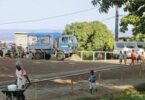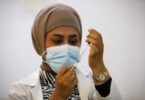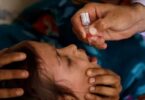BEIJING (Agencies): The Chinese capital, Beijing, has launched a COVID-19 testing drive for most of its 21 million people as authorities raced to contain a growing coronavirus outbreak and avert a city-wide lockdown. Beijing reported 33 new COVID-19 infections on Tuesday, bringing the total number of infections found in the capital to 80 since Friday. The numbers are minuscule, but authorities – who follow a zero-COVID policy – are anxious to avoid the kind of spiralling outbreak that has plunged the commercial hub of Shanghai into a strict lockdown for weeks.
Residents in the southern city – which recorded 1,600 new cases and 52 deaths on Tuesday – have become increasingly frustrated with the authorities’ inability to meet their basic needs during the shutdown. Videos on social media showed people leaning out of Shanghai windows to beat pots and pans in anger, or play “Do you hear the people sing?”, a protest anthem from the musical “Les Miserables”, on flutes and trumpets.
Authorities in Beijing are hoping to avoid such drama by acting swiftly. The city began tests in its most populous district Chaoyang. By nighttime, authorities listed 10 other districts and one economic development zone for mandatory tests this week, covering a total of 20 million people of which 16 million were scheduled to be screened on Tuesday. Al Jazeera’s Katrina Yu, reporting from Beijing, said the city’s residents are being required to undergo three rounds of testing.
“I think that’s recognition that this is the highly infectious Omicron strain and it’s very difficult to catch [on the test] at times,” she said. “After those three rounds of test results are collated on the weekend, we are expecting authorities to make a judgement call on Sunday as to whether there will be any lockdown or any further restrictions imposed in Beijing. But already, people are extremely nervous.”
That anxiety has resulted in panic-buying in some areas, including in Chaoyang, with people lining up at supermarkets with full carts and bulging shopping bags, even as state media tried to reassure the public that there were plentiful supplies. Beijing residents told the AFP news agency they feared a repeat of the sudden lockdown in Shanghai, where people have struggled to obtain food and medical care for non-coronavirus conditions.
“Shanghai’s situation has gone beyond everyone’s imagination, and many people think it’s absurd that a modern metropolis … has handled the situation like that,” one 35-year-old resident of Beijing said. “I believe our situation will not be as bad … but to be honest, we also bought some rice, noodles, grains and oil,” said the human resources professional who identified herself as Ms Zhao. “We’ve made preparations for at least one to two weeks.”
Another Beijing resident, who lives in Chaoyang and was told to stay home for 14 days after one neighbour tested positive, said he felt a “little anxious”. “I’m worried that if we need medicine or other items in the future, we won’t be able to get them delivered,” said the resident, who wished to remain anonymous for fear of reprisal.
“We don’t know how they will calculate the quarantine period, and no one has answered our questions.” For now, schools, stores and offices remain open in Beijing, but the iconic Lama Temple will be closed to tourists from Wednesday, while Beijing’s National Theater will close for the rest of the month. Officials have also urged residents to refrain from leaving the capital and avoid gatherings for the upcoming April 30 – May 4 Labour Day holidays.
Concerns about the economy echoed among residents, businesses and financial markets, with Chinese stocks lingering near two-year lows. “If we can’t go to work, there will be no income,” said Dewei, 31, who worked at a small Chaoyang gym. The economic fallout from any lockdown in Beijing is likely to be less severe than that on manufacturing powerhouse Shanghai, a key cog in national and global supply chains.
“In Beijing, I think it has less impact on businesses because most of these positions can be done from home,” Beijing-based Joerg Wuttke, president of the European Union Chamber of Commerce, told the Reuters news agency. “There is less trucking involved, there is less packaging involved, there is less production going on.” In Shanghai, strict enforcement of measures continued, but plans for a city-wide PCR testing exercise were somewhat derailed by initial forecasts of hail and thunderstorms, later downgraded to cloudy conditions. While authorities say they have relaxed some curbs, most people are still either confined to their homes or cannot leave their residential compounds. Even those who can go out have few options, with shops and most other venues closed.
In areas where leaving home is allowed, residents were asked to take rapid antigen tests on their own, rather than line up for PCR testing in the rain. In the rest of Shanghai, daily PCR tests remained mandatory. The Shanghai government did not immediately comment on signs of growing discontent. Asymptomatic and symptomatic new cases dropped slightly to 15,319 and 1,661, respectively, while cases outside quarantined areas were flat at 217. Other cities that have been under lockdown began easing restrictions once such cases hit zero.






